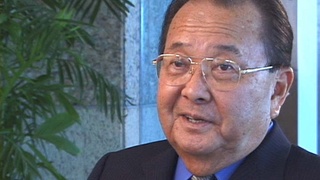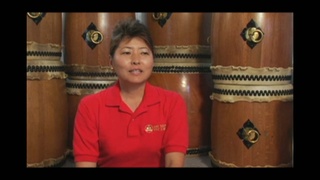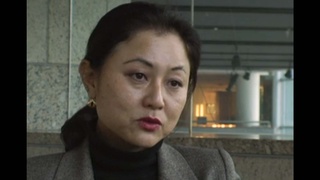Interviews
Death of sister in October 1942
I*: When your sister died, which was I think in October of 1942, were you in Amache [concentration camp AKA Granada concentration camp] by that point or were you still in Santa Anita [assembly center]?
Amache.
I: Now when your family went to Santa Anita, your sister did not join you because she was in sanitarium.
That's right.
I: And she had tuberculosis.
Yeah.
I: Do you think that the internment of your family had any effect on your sister's health?
Definitely. We could have taken care of her privately. She was moved to a facility where I think they didn't care.
I: When you learned about your sister's death, was that something that was expected? Did the family expect her to die when she did?
No.
I: What type of effect did it [her death] have on your family, on your parents?
Well, we were in Granada [concentration camp]. And so my father was stoic and my mother, my mother, mother, fell apart.
*"I" indicates an interviewer (Daniel H. Inouye).
Date: March 2, 2006
Location: New York, United States
Interviewer: Daniel H. Inouye
Contributed by: Asian/ Pacific/ American Studies Program and Institute, Department of Social and Cultural Analysis, New York University.
Explore More Videos

Attempts to sign up for military service
(1917 - 2004) Political activist

Joined Japanese Imperial Army during the WWII (Spanish)
(b. 1929) Nisei Argentinean

Camp stories impact on her career
Sansei judge on the Superior Court of Los Angeles County in California



Relief fund to support Japanese communities (Japanese)
(1900–1996) The mother of Nikkei Brazilian immigration

Role of Assistancia Social dom Jose Gaspar (Japanese)
(1900–1996) The mother of Nikkei Brazilian immigration

Taiko as a family tradition
(b.1960) Third-generation taiko drummer, leader of Maui Taiko

Obon and the community
(b.1960) Third-generation taiko drummer, leader of Maui Taiko

Taiko as a family activity
(b.1960) Third-generation taiko drummer, leader of Maui Taiko

On Being a New Judge and a New Mother
(b. 1942) The first Asian American woman judge

Concentration camp from a Japanese mother’s point of view (Japanese)
Shin-Issei from Gifu. Recently received U.S. citizenship

On Justice Todd’s Daughter, Mia Doi Todd
(b. 1942) The first Asian American woman judge

The multicultural perspective
(b.1960) Third-generation taiko drummer, leader of Maui Taiko

Mothers and Taiko
(b.1960) Third-generation taiko drummer, leader of Maui Taiko
